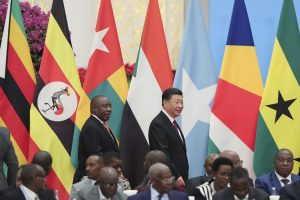It is often unavoidable that discussions involving relations between Africa and the United States or Africa and China trigger questions of implications for all three regions. Since the November 3, 2020 U.S. elections, commentators looking to understand the implications of the new Joe Biden-Kamala Harris administration for Africa have accordingly factored in what the new administration would mean for Africa-China relations.
Notably, Chinese and U.S. interests in Africa may not always align well with African interests toward China or the United States. But that is a discussion for another day.
Under the Biden administration, it is expected that the United States will design a new policy framework for Africa. That might mean China also reviewing its own Africa policy. What are some of the issues and factors that will influence the Biden and the Xi Jinping administrations’ approaches to their competition in Africa? The broad pillars of consideration can be segmented into public diplomacy and soft power, as well as economic, political, and security interests.
As the United States and China continue to vie for close economic and political ties with Africa, the image, credibility, and influence of each of the two powers has come into sharp focus. A few examples suffice.
Probably the biggest source of U.S. soft power on the continent are the American news and entertainment industries, which act as major disseminators of U.S. culture. Broadcasters such as CNN and Voice of America appear to be far more influential than recent Chinese entrants, such China Global Television Network and China Radio international. This ties into language: 24 African countries use English as their official language as well as the lingua franca in the general population. French is also a popular language in the United States, providing links with the 21 French-speaking African countries. China does not have this linguistic advantage as Mandarin is used at a miniscule level on the continent. In some instances, as in South Africa, the introduction of Mandarin in schools has even been opposed. Nonetheless, Mandarin as an alternative foreign language may grow in the coming years as Confucius Institutes – counted at 54 in 2019 – on the continent are established and gain traction.
China, however, makes up for the comparatively lower traction of its language by being the largest provider of government-sponsored university scholarships for Africans. This is an area of public diplomacy and soft power in which the United States and other Western countries such as the U.K. and France were ahead of China only a couple of years ago.

































